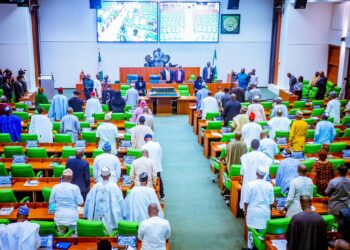According to findings by Nairametrics, the Central Bank of Nigeria (CBN) has been supplying commercial banks with damaged and faded N50 notes, drastically reducing the amount of naira available to demanding customers.
In one video sent to Nairametrics by a reputable source, a bundle of mangled N50 notes said to have been supplied by the apex bank can be seen.
Recommended reading: Naira scarcity is affecting food production
Recently, commercial banks have come under fire for stashing currency, diverting new naira notes, and making the country’s supply of naira notes scarce. As a result, several harrowing and damaging videos have been circulating on social media, especially of Nigerians enduring long queues and fighting in banking halls.
However, Nairametrics’ research into some of the noteworthy banks indicated that the commercial banks have also experienced severe cash shortages as a result of the apex bank’s decreased currency supply.
It was discovered that, a bank branch that deposited old notes worth N100 million to the CBN only received N10 million or 10% of the real amount deposited.
Recommended reading:
President Buhari meets with former Heads of State over naira redesign
Council of state asks Buhari to direct CBN to print more new naira note
CBN debunks claims that NSPMC has no capacity to print more naira notes
Long queues in banks: Following the extension of the original deadline of January 31, 2023, Nigerians have experienced a severe cash shortage during the last two weeks.
- Depositors who laboriously deposited all their old notes before the deadline to safeguard the security of their money now had to wait in long lines to access their money, frequently with no success.
- Others have been forced to pay a premium of 20% to 30% while withdrawing money from POS agents, sometimes spending as much as N300.
- In a similar line, Nairametrics’ research revealed that POS agents have been purchasing cash from some fuel stations that insist on collecting cash from their customers.
Cash is king: The financial adage “cash is king” is currently in use in Nigerian society, particularly given that the alternative means of payment in the country are not entirely reliable.
- Nigerians have recently complained about unsuccessful debited transactions due to the shortcomings of bank digital and mobile transactions.
- Meanwhile, the persistent downtime of banking apps in the past weeks has been ascribed to the huge increase in the use of bank instant payment platforms as NIBSS Instant Payments (NIPs) climbed by 46% year over year to N38.77 trillion in January 2023, while mobile banking transactions increased by 125% to N2.37 trillion in the same period.
The banks’ angle: Contrary to the popular notion that they are hoarding naira notes, the banks have insisted that the apex bank has only given them a limited number of fresh notes.
- A trustworthy source in one of the tier-one banks claims that since the beginning of the year, the central bank has only provided an average of N1 million per week, even though their ATMs disburse roughly N25 million in cash every day.
- In a similar interaction with another banker in one of the tier-two banks, he claimed that last week they deposited N100 million to the apex bank but only received N10 million, which is only 10% of the amount deposited. “When only 10% of deposits are returned to banks, I wonder how banks are going to meet the insatiable demands on Nigerians for cash,” he said.
- A bundle of cash, which would normally translate to N500,000 of N1,000 notes, is now worth N25,000 in N50 notes. This limits the amount of cash that banks can load on their ATMs at a time, and consequently limits the supply to depositors.
However, on the part of the apex bank, the naira redesign policy was aimed at reducing the amount of currency outside the vaults of the banks, which had risen to over 85% of the total currency in circulation as of December 2022.
Although, updates by the CBN governor, Godwin Emefiele indicated that currency outside the banking system had reduced from N2.5 trillion to N900 billion in January 2023. It is thought that a decrease in the amount of surplus liquidity will aid in bringing down the inflation rate.






















